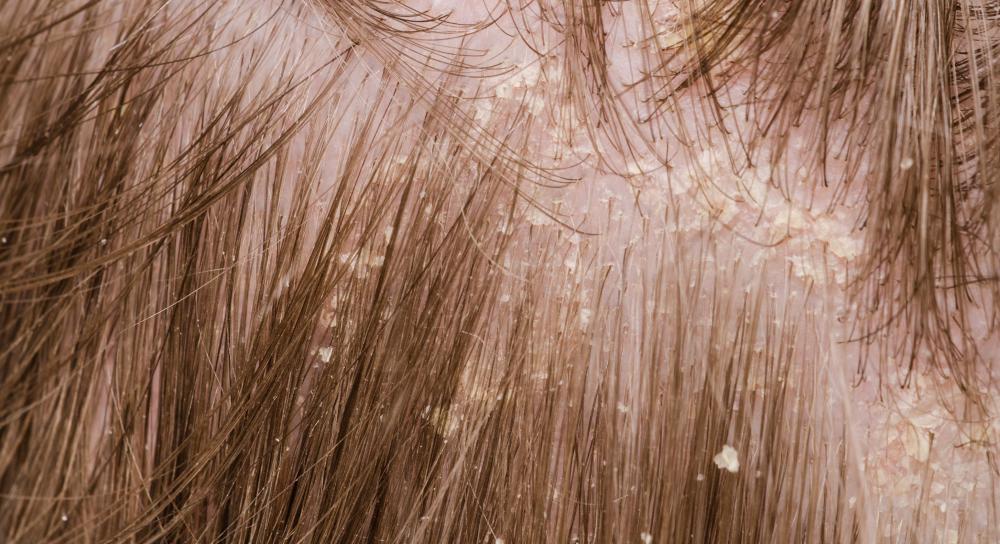At WiseGEEK, we're committed to delivering accurate, trustworthy information. Our expert-authored content is rigorously fact-checked and sourced from credible authorities. Discover how we uphold the highest standards in providing you with reliable knowledge.
What are the Different Treatments for Dermatitis of the Scalp?
The most common treatment for dermatitis of the scalp, scientifically known as seborrheic dermatitis, is practicing good hygiene. Frequently washing the scalp goes a long way toward preventing the buildup of substances that can cause inflammation and flaking of the skin. There are also a variety of over-the-counter shampoos which help reduce itchy, flaky skin on the scalp. If store-bought shampoos don't do the trick, a dermatologist may be able to prescribe extra-strength shampoos or lotions that contain steroids. Infants with dermatitis of the scalp should be treated with milder shampoos, or by regularly brushing the hair to break up flakes.
Practicing good hygiene is the best defense against dermatitis of the scalp. Washing the scalp and hair frequently is the best way to prevent fungus, oils and bacteria from building up. If allowed to build up, such elements can agitate the skin enough to cause noticeable rashes. Those rashes aren't only painful, they tend to cause flaking of the skin. Skin flakes that get trapped in hair can be quite noticeable, resulting in dandruff—an unpleasant ordeal for those affected by it.

There are many over-the-counter shampoos able to successfully treat dermatitis of the scalp. Compared with ordinary shampoos, dermatitis-treating shampoos contain different ingredients, such as zinc pyrithione, selenium sulfide, salicylic acid and coal tar. These ingredients work on the scalp to reduce the itchy and flaky skin symptoms of dermatitis. Such shampoos are only meant to be used 2-3 times a week. When using the shampoo, it's important to leave it on the scalp for 3-5 minutes before rinsing, in order to give a sufficient amount of time for the treatment to work.

If over-the-counter shampoos fail to alleviate the condition, dermatologists can prescribe skin products that contain steroids. Such products are powerful skin treatments that offer the best guarantee for treating dermatitis of the scalp. If by chance the dermatitis still lingers, a dermatologist may OK the combined use of over-the-counter and prescription treatments. If the condition still persists, there may be something more than dermatitis at play, such as eczema, a more chronic skin condition that also results in itchy, inflamed skin.

Infants who develop dermatitis of the scalp are said to have cradle cap. Young babies are particularly vulnerable for getting dermatitis. Their soft, new skin is highly susceptible to developing rashes and flakes. Fortunately, cradle cap is generally easy to prevent and treat. Simply going through the hair with a soft brush is often enough to break up flakes and maintain healthy skin. Mild, baby-safe shampoos are also available to help prevent cradle cap.
AS FEATURED ON:
AS FEATURED ON:













Discussion Comments
Cradle cap is very common in infants. Both my children had it. I didn't have to do anything aside from applying some oil and brushing gently to remove the flakes. It went away by itself both times.
@bear78-- I'm not a doctor and I do think you should see a doctor about this. But as far as I know, dermatitis is the general name given for skin inflammation and irritation. It can have different causes.
It definitely sounds like there is something going on with your scalp. It doesn't sound like psoriasis simply because psoriasis causes a dry scalp not oily. Over-production of oil may have to do with the shampoo you're using or it may be caused by a fungal infection.
Although washing the scalp often is good, washing too often may cause the scalp to produce more oil to make up for the dryness. Other times, if fungi have inhabited the scalp, they can also trigger more oil production.
Simply changing your shampoo to something milder or if you have an infection, using an anti-fungal shampoo may resolve the problem. See a dermatologist to get to the bottom of this.
I practice good hygiene. I wash my scalp and hair once a day, every day. But I still have dermatitis. I have flakes and my hair becomes oily quickly. At the end of the day, I look like I haven't washed my hair for several days and there is dandruff on my clothes. I'm not sure what to do. I'm using a dandruff shampoo which seemed to work in the beginning but it's not anymore.
Does anyone have any recommendations for me?
Post your comments